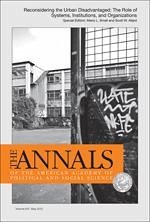
Reconsidering the Urban Disadvantaged: The Role of Systems, Institutions, and Organizations
Versandkostenfrei!
Nicht lieferbar
The recent economic recession and a sluggish recovery have made conditions especially precarious for the most disadvantaged members of the urban poor population-those with criminal records, health conditions, undocumented status, or unstable housing. The authors in this volume of The ANNALS argue that the fewer the resources to which people have access, the more their circumstances will depend on the organizations in which they participate, the systems in which these organizations operate, and the institutions governing the behaviour of both. Over the last 25 years, social science on urban pov...
The recent economic recession and a sluggish recovery have made conditions especially precarious for the most disadvantaged members of the urban poor population-those with criminal records, health conditions, undocumented status, or unstable housing. The authors in this volume of The ANNALS argue that the fewer the resources to which people have access, the more their circumstances will depend on the organizations in which they participate, the systems in which these organizations operate, and the institutions governing the behaviour of both. Over the last 25 years, social science on urban poverty has grappled primarily with evidence of deindustrialization and the loss of low-skilled manufacturing jobs. In turn, structural economic change has transformed family structure, educational attainment, crime, and geographic concentration of the poor. Researchers have approached these issues from a limited set of theoretical perspectives, perspectives wherein the core units of analysis, aside from the market, have been the individual and the neighbourhood. The editors of this volume argue that, today, understanding the conditions of these highly disadvantaged populations requires a focus on not only individuals and their neighbourhoods but also, and perhaps more importantly, on the organizations that structure their lives, the systems in which those organizations are embedded, and the institutions that regulate both.



